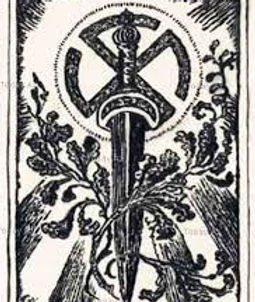
 |  |  |
|---|---|---|
 |  |
The Thule Society attracted about 250 followers in Munich and about 1,500 in greater Bavaria. Its meetings were often held in the luxury Hotel Vierjahreszeiten (Four Seasons Hotel) in Munich.
The followers of the Thule Society were, by Sebottendorff's own admission, little interested in occultist theories, instead they were interested in racism and combating Jews and Communists. Nevertheless, Sebottendorff planned and failed to kidnap the Bavarian socialist prime minister, Kurt Eisner, in December 1918.
During the Bavarian revolution of April 1919, Thulists were accused of trying to infiltrate its government and of attempting a coup. On April 26 the Communist government in Munich raided the Society's premises and took seven of its members into custody, executing them on April 30. Amongst them were Walter Nauhaus and four well-known aristocrats including Countess Heila von Westarp, who functioned as the group's secretary, and Prince Gustav of Thurn and Taxis who was related to several European royal families. In response, the Thule organized a citizens' uprising as White troops entered the city on May 1.
In 1918, the Thule Society bought a local weekly newspaper, the Munchener Beobachter (Munich Observer), and changed its name to Munchener Beobachter und Sportblatt (Munich Observer and Sports Paper) in an attempt to improve its circulation. The Munchener Beobachter later became the Volkischer Beobachter: People's Observer), the main Nazi newspaper. It was edited by Karl Harrer.
On January 5, 1919 Anton Drexler, who had developed links between the Thule Society and various extreme right workers' organizations in Munich, together with the Thule Society's Karl Harrer, established the Deutsche Arbeiterpartei (DAP), or German Workers' Party. Adolf Hitler joined this party later in the same year. By the end of February 1920, the DAP had been reconstituted as the Nationalsozialistische Deutsche Arbeiterpartei (NSDAP), or National Socialist German Workers' Party, generally known as the "Nazi Party".
Sebottendorff had by then left the Thule Society, and never joined the DAP or the Nazi Party. Dietrich Bronder (Bevor Hitler kam, 1964) alleged that other members of the Thule Society were later prominent in Nazi Germany: the list includes Dietrich Eckart (who coached Hitler on his public speaking skills and had Mein Kampf dedicated to him) as well as Gottfried Feder, Hans Frank, Hermann Goring, Karl Haushofer, Rudolf Hess, Heinrich Himmler and Alfred Rosenberg.
Historian Nicholas Goodrick-Clarke has described this membership roll and other, similar claims as "spurious" and "fanciful", noting that Feder, Eckart and Rosenberg were never more than guests to whom the Thule Society extended hospitality during the Bavarian revolution of 1918, although he has more recently acknowledged that Hess and Frank were members of the Society before they came to prominence in the Nazi Party.
It has also been claimed that Adolf Hitler himself was a member. Evidence to the contrary shows that he never attended a meeting, as attested to by Johannes Hering's diary of Society meetings. It is quite clear that Hitler himself had little interest in, and made little time for, "esoteric" matters. Wilhelm Laforce and Max Sesselmann (staff on the Munchener Beobachter) were Thule members who later joined the NSDAP.
THE THULE SOCIETY
Start to Learn AGAIN
FENIX SPRING
HISTORY
Secret Societies
ACTIVITIES
